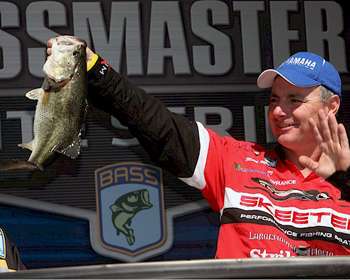
The question of how to change the line on your favorite fishing reel, while seemingly inoffensive at first glance, can generate a heated debate in many bass fishing circles.
Some anglers (especially those who get their line from sponsors) prefer to respool after every outing, while others will only replace line when absolutely necessary. If you're in the category of angler who believes that respooling should be done routinely, but not frequently, you're not alone.
Elite Series angler Mark Menendez shares the same sentiment. "I'm one of those guys who 'budgets' their fishing line," he says. "I truly believe that with the quality fishing lines available today, it's not necessary to change line every time you get ready to go fishing."
To the budget-conscious angler, this is good news; however, Menendez points out there are some limitations. "If I'm using really light line, like 6-pound test, then yes, I'll change it a lot more often than I will change 20-pound test," he says. Heat is fishing line's arch enemy, but Mark, who has fished as many as three tournaments consecutively without re-spooling his primary reels, says the key is to avoid direct sunlight.
"When I'm practicing and I've got 15 rods out on the deck all day long, I'm probably going to think about changing the line out at the end of the day," he explains. "More often than not though, I'll keep the rods that I'm not using in the locker and out of the sun so that I won't have to change the line." One of the biggest complaints that drives an angler to frequently respool is line memory. With fluorocarbon, this is particularly apparent, but Menendez has developed a strategy for erasing line memory.
"If it's been a week since I've used a reel with fluorocarbon in it, I'll tie the end of my line to a cleat in my boat and back off about 40 or 50 feet and pull it tight," he says. "That stretches the line out, causes it to relax a little, and helps it perform just as well as brand new line most of the time." To avoid having to respool continually, he will also remove the last 10 to 15 feet of line that's been exposed to shoreline cover as it will usually contain a number of nicks and abrasions.
"You can go down to my boat right now and find 10-foot tag ends lying all over the place," he allows. "It really boils down to economics for me, and in the economic times that we're going through right now it's good to be frugal. Managing line expenses is definitely one of the ways that you can cut costs."
With that in mind, Menendez acknowledges that having fresh line on all their reels is a confidence issue for some anglers, and he doesn't judge them for respooling frequently. "Eighty percent of bass fishing is about confidence," he says.
"If you like to re-spool your line the night before a tournament because it gives you confidence the next day on the water, by all means, go for it."
(Provided by Z3 Media)




